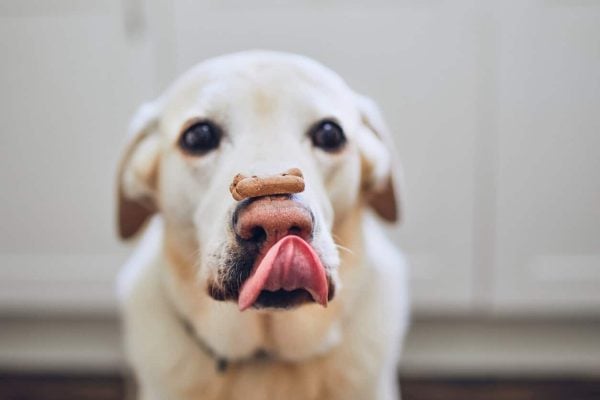- Not a substitute for professional veterinary help.
You might enjoy eating candy as a sweet treat, but experts say dogs shouldn’t eat candy for health and toxicity reasons. Whether it is hard candies, gummy candy, or soft chewy candies, these human treats aren’t safe for dogs because of the sugar (and sometimes fat) content.
Some types of candy and chewing gum may also contain xylitol, a sugar substitute that’s highly toxic to dogs, says Lucy Hyams, a veterinary technical advisor at Protexin Veterinary. Because of these risks, dogs shouldn’t eat any amount of candy. The best way to keep your dog from eating candy is to store the sweets in a space your dog can’t reach.
Read on to learn more about the risks of dogs eating candy and what to do if your dog eats candy. We’ll also share some examples of dog-friendly treats to give your pup instead.
What To Do If Your Dog Eats Candy
It’s not uncommon for dogs to get into chewing gum and candy you keep at home or in your bag or car, says Dr. Joanna Woodnutt, MRCVS, a veterinarian at Petlearnia.
First, don’t panic and assess your dog for any symptoms. Seek veterinary care if you notice any unusual behaviors or symptoms, including the following:
If your dog gets into candy and eats a lot of it, they could experience bloat along with any of the side effects listed above. Bloat can happen when a dog eats too much of any food and your dog’s stomach fills with gas and expands. This can lead to severe health consequences, including death, if not treated by a vet right away.
Signs of bloat include lethargy, a swollen belly, and signs of pain or distress.
Dr. Antje Joslin, veterinarian and owner of Tolleson Animal Clinic, notes that if you notice your dog has eaten candy, take a minute to determine what type of candy they ate and how much they ate. Also, check whether they ate any wrappers or candy containers. You can then use this information when you contact your vet or Pet Poison Control for guidance on the best next steps.
Why Shouldn’t Dogs Eat Candy?
Avoid giving dogs candy because some candies can make your dog very sick. Ingredients in more popular, modern sweets, like artificial sweeteners, can be fatal to dogs. In addition to poisoning, Dr. Woodnutt tells us candy offers no health benefits or nutritional value for dogs.
Typical candy ingredients that may hurt your dog’s health include:
If your dog eats one or two small pieces of candy, they’ll probably be just fine—as long as the candy doesn’t contain any ingredients that are toxic to dogs. If you catch your dog when they’ve just swallowed a hard candy, monitor them closely to make sure they don’t choke.
Health Risks For Dogs Who Eat Candy
Eating candy can cause a number of serious health symptoms for dogs.
Your dog may experience some of the following reactions after eating candy:
Dr. Woodnutt says dogs are more likely to experience negative side effects if they eat candy regularly.
Important: If the candy or gum contains xylitol or any other toxic ingredients, contact your vet right away because signs of hypoglycemia can develop within 30 minutes of ingesting xylitol.
Safe Treats For Dogs
Dogs don’t need sugar, but you can give them any of the following—in moderation only—if you’d like to treat them on an occasional basis.
- Fruit, like apples, bananas, blueberries, watermelon, and more
- Sweet potatoes
- Commercial dog treats made with safe ingredients
- Peanut butter without xylitol or other added ingredients like salt and sugar
If you want to get creative on a special occasion for your dog, vets recommend the following fun treat ideas:
- Make frozen fruit treats by blending fruit with water or plain yogurt and freezing it in ice cube trays.
- Spread a small amount of peanut butter on an apple slice or other dog-friendly fruit or vegetable.
- Buy dog-safe ice cream or cake.




